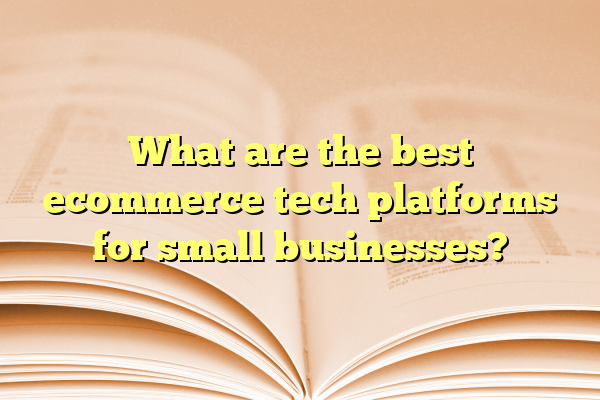
What are the best ecommerce tech platforms for small businesses?
In today’s digital-first world, launching an online store has never been more accessible. However, choosing the right eCommerce platform is critical to the growth and sustainability of any small business. With a wide array of options available, it’s crucial for small business owners to select a platform that aligns with their budget, technical capabilities, growth goals, and industry requirements.
This article examines some of the best eCommerce technology platforms for small businesses, comparing their features, strengths, and potential drawbacks.
Contents
1. Shopify
Shopify is widely regarded as one of the leading eCommerce platforms for small to mid-sized businesses. It offers a user-friendly interface, scalable functionality, and comprehensive customer support options. The platform provides everything from website design to secure payment processing and shipping integrations.
- Pros: Easy to set up and customize, extensive app ecosystem, strong SEO tools, and a secure checkout process.
- Cons: Monthly fees can grow with add-ons, limited free themes, and reliance on third-party apps for certain features.
Shopify is ideal for businesses looking for an all-in-one solution without needing advanced technical knowledge.

2. WooCommerce (for WordPress users)
If you’re already using WordPress, WooCommerce is a logical and powerful choice. As a free open-source plugin, it transforms any WordPress site into a fully functional online store. It’s particularly popular among technically proficient entrepreneurs who want a high level of customization.
- Pros: Free to install, highly customizable, integrates seamlessly with WordPress, vast plugin support.
- Cons: Requires more technical skills, updates can cause compatibility issues, hosting and security is your responsibility.
WooCommerce is best suited for business owners who prefer more control over their site’s structure and performance.
3. BigCommerce
BigCommerce is another highly scalable eCommerce solution good for small businesses with big growth plans. It offers built-in features like multi-channel selling (Amazon, eBay, Facebook, etc.), advanced SEO tools, and robust analytics.
- Pros: No transaction fees, native multi-channel selling, strong performance and speed.
- Cons: Slightly steeper learning curve, higher starting costs compared with some other platforms.
BigCommerce is a powerful platform for small businesses that anticipate steady growth and want an enterprise-level toolset from the start.

4. Squarespace
Squarespace is known for its stunning design templates and easy-to-use interface. While it’s typically associated with content-focused websites, Squarespace has robust eCommerce capabilities, especially for businesses selling physical or digital goods.
- Pros: Beautiful design templates, all-in-one hosting solution, intuitive drag-and-drop interface.
- Cons: Limited third-party integrations, fewer payment gateway options, less scalable.
It’s ideal for creative professionals or boutiques where branding and aesthetics are part of the value proposition.
5. Wix eCommerce
Wix offers a beginner-friendly platform with drag-and-drop features, flexible design templates, and built-in eCommerce tools. While it doesn’t have the depth of Shopify or BigCommerce, it’s more than sufficient for smaller operations.
- Pros: Easy setup, affordable pricing, visual design flexibility, extensive template library.
- Cons: Limited scalability, fewer advanced eCommerce tools, basic SEO capabilities.
For businesses just starting out or those testing the waters of eCommerce, Wix provides a cost-effective and visually appealing solution.
Other Considerations
Beyond choosing the right platform, small businesses should also consider:
- Payment gateway compatibility: Ensure the platform supports your preferred payment processors.
- Mobile responsiveness: Mobile users now make up the majority of online shoppers, so your store must be mobile-friendly.
- Scalability: Choose a platform that can grow with your business, handling more traffic, products, and customers as needed.

Conclusion
Selecting the right eCommerce technology platform is one of the most important decisions a small business can make. Each of the platforms discussed—Shopify, WooCommerce, BigCommerce, Squarespace, and Wix—offers unique benefits tailored to different types of businesses and technical needs.
For example, an RC online shop looking to showcase products, manage inventory, and offer a seamless checkout experience could benefit greatly from the right platform choice.
Ultimately, the best choice depends on your specific business goals, budget, technical expertise, and the kind of customer experience you aim to deliver. Taking the time to evaluate these options carefully can lay the foundation for a successful and sustainable online presence.
